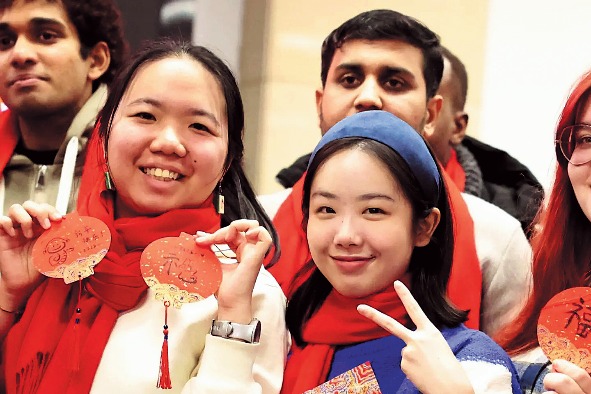Talented returnees benefit from new lives in country
By Yu Ran in Shanghai | China Daily | Updated: 2023-02-20 07:13

Sense of belonging regained, job prospects improve
Countless talented people are returning to the Chinese mainland after studying and working abroad for several years, as they believe their homeland offers more promising job prospects and a sense of belonging.
According to a report released last year by the Ministry of Education, the number of returnees seeking jobs in China rose by nearly 34 percent year-on-year in 2020.
More than 96 percent of those surveyed had either returned or were planning to come back to China, and nearly 13 percent of those who had overseas work experience had decided to return home, the ministry's report on the employment competitiveness of overseas students stated.
Liu Sisi, 38, from Beijing, said 10 years of studying, working and living abroad made her stronger and more independent, but she was still determined to return to China.
"I am very grateful for my experience overseas, as I had to adjust to a variety of environments, languages and cultures, and overcome difficulties by myself. This enabled me to become stronger in heart," said Liu, who graduated from Soochow University in Suzhou, Jiangsu province, where she studied public management, and then went on to study in Spain.
In 2009, Liu applied for a one-year course in Spanish in Salamanca, Spain. She obtained master's degrees in environment and economics in Madrid over a three-year period, but always intended to return to China.
"In Spain, I worked part-time for education service companies by helping students apply for visas. I also taught Chinese to children from middle-class families," Liu said.
However, she became depressed during her final year of study, when she met her future husband, who was studying in Bordeaux, France.
Liu has since studied French, got married and worked as a freelance supplying Chinese students with educational services such as university applications. In 2015, she and her husband went to live in the Scottish city of Glasgow, where she worked as a language teacher at a Chinese school, and gave birth to her first child.
In 2018, the couple moved to Iceland, where Liu continued working part-time as an educational consultant and translator.
"Overseas work experience in the education sector allowed me to see things from a different perspective, which I believed could be used to help more local students prepare for studying abroad," said Liu, who was keen to return to China as she wanted better career development prospects and for her child to grow up at home.
At the end of 2019, she was eventually offered a position at a business college in Suzhou after submitting dozens of resumes and failing to pass several final interviews. Her husband found a job at Xi'an Jiaotong-Liverpool University in the city.
Liu said: "I was able to make up for my lack of experience in graduate employment at the business college by dealing with human resources departments at different companies in a variety of industries. During this time, I was also preparing to start my own business."
Figures from the Ministry of Science and Technology show that in 2021, a record 1 million-plus students studying overseas returned to China to become innovative entrepreneurs.
That year, Liu launched her own company offering customized consulting services with detailed plans and professional advice for students planning to apply for higher education courses.
"I expected being an entrepreneur in China to be tough, but the good thing is that I am motivated to keep learning to avoid being left behind," said Liu, who developed consulting services for early education in 2021 to help parents choose suitable curricula for their children.
According to a report on returning Chinese students seeking jobs released by LinkedIn last year, 71 percent of such students prefer working for foreign-funded enterprises. More than 80 percent want to work in first-tier cities, and nearly half prefer to work in East China. About 37 percent hope to find a job and work abroad after graduation.
























